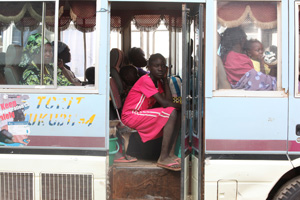
The female face of migration.
Credits: Sara Farjado for CRS
In Tinzawaten there’s next to nothing to eat or drink, the houses are roofless shells, it’s freezing at night, scorching in the day, murder and rape go unpunished, women are sold as slaves and babies are born in the open.
This is the desert of Mali. The people of Tinzawaten are migrants who’ve been deported from Algeria, shoved across the border and dumped with nothing.
The harrowing scene is described by Fr Jerome Otitoyomi Dukiya at a conference organised by the Caritas Internationalis General Secretariat and Caritas Senegal in Saly, Senegal. Fr Jerome said, “Algeria signed an agreement with the EU in exchange for financial and development aid that migrants would only be returned to their own countr y. The deal doesn’t mean abandoning them to years of limbo in places like Tinzawaten. But who’s making a fuss about it?”
Caritas is. It is advocating for full legal protection for migrants, especially women, as their numbers grow. The “Female Face of Migration” conference called for international law which already exists to be properly enforced and asked Caritas members to monitor border areas, like Tinzawaten.
Delegates came from all over the world to the conference in Senegal, itself the hub of African migration, bringing similar stories of abuse with them. Najla Chahda, the director of Caritas Lebanon’s Migrant Centre literally tripped over one at the airport in Beirut. “I found a Bangladeshi woman lying on the floor with blood coming from her nose. When I got him, the airport doctor said this was because she was haemorrhaging in her stomach. I called the woman’s employer, but he said that as he had brought her to the airport and signed her release papers, she was no longer his responsibility.”
This is the kind of case Caritas Lebanon deals with all too frequently. I t offers medical help to women who have been abused or who are sick and has a team of lawyers on hand. “ We won an unprecedented legal victor y and compensation for a badly treated migrant worker ” said Najla Chahda, “But there are also those we don’t get to help, like the Ethiopian and Indonesian women who have committed suicide. The price paid by women migrants is too high.”
